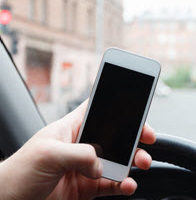Warning: Distracted Driving in the Form of Texting is Illegal in Miami

The growing use of cell phones while driving is becoming a wide-spread problem for drivers, no matter the age. According to the Florida Highway Patrol, distracted driving remains one of the major causes of traffic accidents. This is why distracted driving, specifically texting and driving is now illegal in Miami.
According to AAA’s distracted driving site, 42% of drivers admit to reading a text or email while behind the wheel. And more than 30% admit they type on their devices while driving. Each day in Miami, car accidents are caused by texting and driving. A 2016 NBC Miami News report shows that a 25-year-old man lost his life while texting and driving. To minimize the level of car accidents occurring and to keep Floridians safe, the State of Florida no longer tolerates texting while driving –making the act of texting while driving illegal.
Florida Ban on Texting While Driving Law
Florida’s new no texting while driving law went into effect on July 1, 2019, and is cited as Florida Ban on Texting While Driving.
The law also seeks to save children and workers in construction zones. On October 1, 2019, law enforcement will begin pulling over and issuing warnings for drivers found using wireless communications devices in school and work zones.
Law enforcement will begin issuing citations for those caught texting while driving starting January 1, 2020.
What is a Wireless Communication Device?
A wireless communications device is any handheld device capable of receiving or transmitting messages, storing data, or connecting to the internet. A wireless communication device includes the following:
- Cell phone or smartphone
- Tablet
- Laptop
- Two-way messaging device
- Electronic handheld gaming device
Texting While Driving Penalties
First offenses for texting and driving include a $30 fine. Second offenses within 5 years of the first offense include a $60 fine and 3 points on the driving record. Court costs and fees will also apply.
For those caught using a wireless communication device in a school and work zone will be fined $60 with 3 points on the driving record.
Exceptions
The law does not apply to those performing official duties such as emergency responders, or law enforcement.
How to Prevent Texting and Driving
The best way to prevent texting and driving is to simply put the phone down and focus on the road. Wait until you get to your desired location to text or make a call or send a text. But if you must talk on the phone while driving, there are some options.
In an article with WPLG Local 10 News, Florida Highway Patrol spokesman Alex Camacho recommends using a phone holder. He also recommends using Bluetooth technology so drivers can have voice control to prevent reaching for the phone while driving.
Spencer Morgan Law Cares About Your Safety
If you receive injuries as a result of someone texting and driving, call the Miami car accident lawyers at Spencer Morgan Law at 305-423-3800 for a free consultation. We are ready to discuss your personal injury case and help you protect your legal rights.
Resources:
aaa.com/dontdrivedistracted/
local10.com/news/florida/what-you-need-to-know-about-new-texting-while-driving-law
https://www.smorganlaw.com/common-types-of-distracted-driving/
